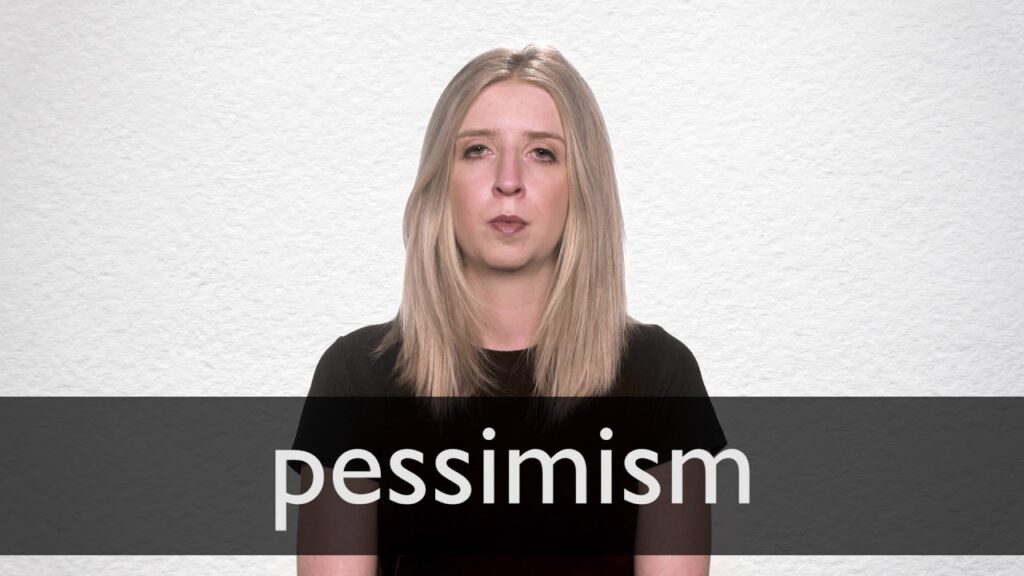Contents
What Is Pessimism?

You may have never heard the term pessimism before-but it is something that affects most people during their lifetime. A pessimist is someone with a negative outlook on life, but with the right perspective change, this can be one of many things that can make you happy. You’ll find out how to become more positive and develop beliefs that will improve your quality of life in just five steps.
Pessimism is a common mental disorder that causes an individual to believe that negative events are more likely or more dangerous than positive events. Pessimists often experience feelings of hopelessness, inadequacy, and unhappiness. This article will provide you with tips on how to become a happier person.
Pessimism is a mental disorder that can be changed with the right perspective change. With these five steps, you can become a happier person and learn to focus on the positives in life. Pessimism is a cognitive style in which individuals focus on the negative aspects of a situation. Pessimists tend to see the glass as half-empty, and they often believe that things will never get better.
People who are pessimistic generally have a negative outlook on life, expecting bad things to happen. They are more likely to believe that they will not be successful, that they will not find happiness, and that they will not be able to overcome the challenges in their lives.
Pessimism Causes
Pessimism is often caused by several different factors, including trauma or the loss of a loved one. Some studies have found that living in hardship can increase the risk for depression and being pessimistic later in life. This may be because people who face adversity are forced to see reality in a harsher light.

Other causes of pessimism may include:
- Growing up in an environment where there is constant criticism or negative reinforcement
- Feeling like you are not good enough or that you have to be perfect to be accepted by others
- Experiencing physical or emotional abuse
- Having a mental illness such as anxiety or depression
If you feel like you are experiencing a lot of pessimism, it is important to seek help. There are many resources available to you, including therapy, medication, and self-help groups. It is possible to overcome pessimism and learn to live a happier life.
Drawbacks Of Pessimism
While pessimism may have some benefits in specific situations, overall it can be harmful because it can cause people to feel overwhelmed, not try their best at tasks, or give up easily. It can also lead to health issues such as lowered immune systems and increased blood pressure.
On the other hand, some studies show that when it comes to predictions, pessimists tend to be more accurate than optimists. For example, one study found that pessimism was associated with more accurate predictions of future negative events.
Pessimism can be harmful because it can cause people to feel overwhelmed, not try their best at tasks, and give up easily. Pessimism can also affect people’s physical health by lowering their immune systems and increasing blood pressure.
Benefits Of Pessimism

Pessimism has its benefits, as well. People who are pessimists are often very realistic, and they are less likely to be surprised by bad news. They also tend to be more careful in their decision-making, because they know that not everything will go their way. In addition, pessimists are usually very good problem-solvers, because they have already thought of all the possible ways a situation could go wrong. Finally, pessimists are often very survivors, because they have learned how to cope with difficult situations.
Despite these benefits, most people would rather not be pessimists. Pessimism is often seen as a negative personality trait, and it can be hard to maintain a positive attitude when things are going bad. However, if you are able to accept your pessimism and use it to your advantage, you can be a more successful and happier person.
There are some benefits to being a pessimist in certain situations, though. One study showed that college students who scored high on the pessimism scale were better at predictions than those who scored low, especially when predicting future negative events.
How To Become Optimistic?
Pessimistic people tend to focus on the negative because they feel it’s real-what if something bad happens? What if this doesn’t work out? What do I have going for me anyway? It’s not worth it! But in reality, most things go well and there are plenty of good things in life too…so why not focus on those positives instead?! With these five steps, you can change your attitude from pessimist to optimist in no time.

1. Awareness: first and foremost you must be aware of your thoughts and the patterns that they follow. This means that you need to be mindful of your words and the meanings behind them, as well as your body language and the emotions that you’re displaying.
2. Acceptance: once you have become aware of your pessimism you need to accept it and forgive yourself for having negative thoughts. Everyone has them and they’re nothing to be ashamed of!
3. Action: once you have been able to recognize the patterns of your pessimistic thinking, take action on those thoughts. For example, if you think that something bad is going to happen then remind yourself that most things go well. This takes practice, but over time it will become easier to think positively.
4. Attitude: your attitude is everything and it’s ultimately what will determine whether you’re a pessimist or an optimist. Pessimists tend to be negative, unyielding, and judgmental-while optimists are positive, flexible, and compassionate.
5. Beliefs: our beliefs are what shape our reality, so it’s important to have positive ones! Pessimists often believe that the world is a dangerous place, that they’re not good enough, or that the worst will happen. Replace these negative beliefs with positive ones such as “the world is a good place” or “I am good enough”.
Pessimism And Realism
 Pessimism is a commonly misunderstood concept. People often confuse pessimism with realism and downbeat moods, but they are actually very different:
Pessimism is a commonly misunderstood concept. People often confuse pessimism with realism and downbeat moods, but they are actually very different:
Realistic thinking: Refers to the ability to accurately assess one’s abilities and limits as well as the challenges one may face.
Pessimism: Also refers to the tendency to focus on negative aspects of a situation, feeling that oneself or others are inadequate or flawed. This can cause an individual to believe that nothing positive will come out of any given situation. Pessimists make negative predictions about their futures and other people’s futures, expecting failure. Pessimism is a common trait of people who suffer from depression. Being pessimistic is not the same as being “realistic” about life’s problems or downbeat due to bad experiences or losses. Rather, it is an exaggerated negative attitude in which the individual focuses on the unpleasant aspects of life such as pain and unhappiness, often expecting the worst to happen.
Downbeat moods: Arise when people are coping with negative experiences in the past or present, possibly caused by loss of a job, relationship problems, being sick, or being rejected. However, they do not have an inherent belief that they will fail in the future nor is it pervasive across different circumstances.
Pessimism should not be confused with healthy skepticism, which is a realistic attitude that allows people to question information and assess whether it is accurate before accepting it. Skepticism does not involve expecting the worst to happen in every situation.
Tips To Getting Out Of A Pessimistic Mindset
There are a few things that you can do to get out of a pessimistic mindset:
Challenge Your Negative Thoughts
 When you find yourself thinking negatively, ask yourself whether there is any evidence to support your thoughts. Are you assuming that things will go wrong, or are you predicting the future? Most of the time, our negative thoughts are based on assumptions, and they are not actually accurate predictions.
When you find yourself thinking negatively, ask yourself whether there is any evidence to support your thoughts. Are you assuming that things will go wrong, or are you predicting the future? Most of the time, our negative thoughts are based on assumptions, and they are not actually accurate predictions.
Look For The Positive In Every Situation
Even if things are going badly, there is always something positive that you can focus on. Maybe you are able to learn from your mistakes, or maybe you are able to appreciate your good luck, even more, when things are tough.
Think about the bigger picture
When you are feeling bad about your current situation, try to remember everything that you have going for you. Focus on the positive aspects of your life, including having a roof over your head or being healthy. When things are tough, it is easy to forget all the good things that are still happening in your life.
Learn to manage stress better
Pessimists often feel overwhelmed by stress, and this can lead to negative thoughts and behaviors. If you learn how to manage your stress better, you will be less likely to fall into a pessimistic mindset. There are several different ways to do this, including exercise, relaxation techniques, and journaling.
Talk to someone about your feelings
When we bottle up our feelings, it can lead to negative thoughts and behaviors. If you talk to someone about how you are feeling, you will be more likely to deal with your pessimistic thoughts in a healthy way.
Challenge yourself to be more optimistic
If you are finding it difficult to be optimistic, challenge yourself to do something that is normally out of your comfort zone. For example, if you typically stay inside during the weekend, try going outside and doing something new. It can be difficult to get out of a pessimistic mindset, but it is possible with some effort.
Ways To Stay Positive

Many people do not realize that there are many different ways to stay positive in the face of adversity.
- First, you need to be realistic about your feelings and thoughts. You may feel like nothing good will happen, but that is only your opinion based on your feelings. There are plenty of things in life that go well for everyone, and if you focus on those instead, it will be easier to keep a positive attitude.
- Secondly, you should take a break from negativity. If you feel like everything is going wrong and you cannot find anything good in the world, then spend some time offline or with friends who have a more optimistic view of life. It can be easy to get stuck in a negative mindset but practicing optimism is one way out.
- Thirdly, try not to take things for granted. One of the problems with being a pessimist is that you tend to focus on the bad things in life and forget about the good. When you are able to appreciate the good things, it will be easier to stay positive during difficult times.
- Fourthly, don’t be afraid to ask for help. It is okay to admit that you are struggling and need some support. When you are able to ask for help, it will be easier to stay positive and get through difficult times.
Finally, practice self-compassion. One of the main reasons people become pessimists is because they are hard on themselves. Remember that it is okay to make mistakes, and you should treat yourself kindly. This will help you stay positive in the face of adversity.
In order to be a more optimistic person, practicing these techniques can help. While it may not be easy at first, with time and effort you will become a more positive person.
Conclusion
The way you perceive the world, your thoughts matter. Pessimism is not always a bad thing; it can be used to get out of tough situations and work on improving yourself for the future. If you’re feeling down or pessimistic about something that has happened in your life, take some time to process these emotions before making any decisions because optimism may just save you in the long run! You never know what opportunities may present themselves tomorrow if only they could see how much potential we have inside ourselves.
If you are looking for affordable Online Counseling MantraCare can help: Book a trial therapy session


